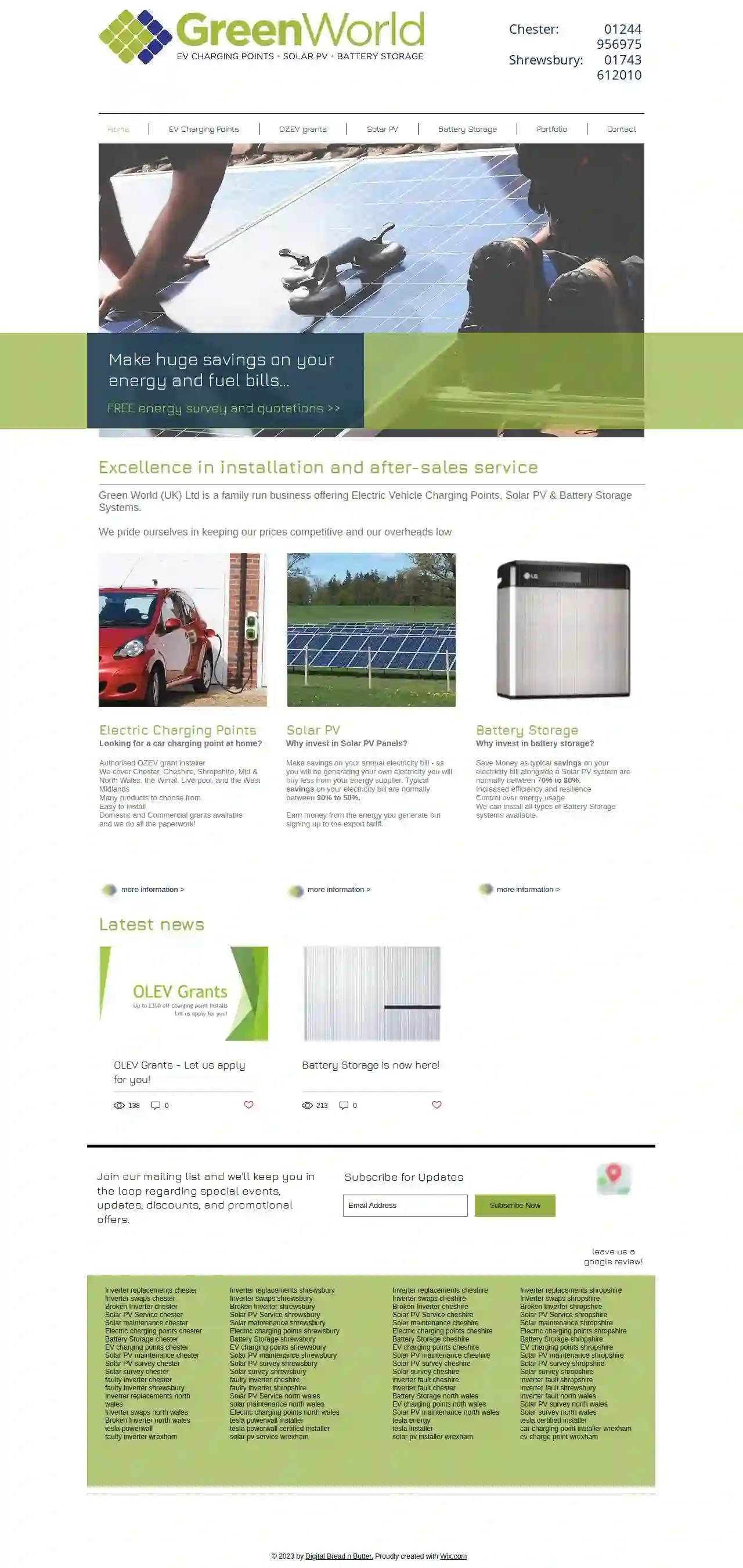Solar Installers Stone
Top 10 Solar Company in Stone
Get up to 3 Local Solar Installers quotes for your project today! Compare profiles, reviews, accreditations, portfolio, etc... and choose the best offer.

Green World
4.25 reviewsStone, GBGreen World (UK) Ltd is a family run business offering Electric Vehicle Charging Points, Solar PV & Battery Storage Systems. We pride ourselves in keeping our prices competitive and our overheads low.
- Services
- Why Us?
- Gallery
Get Quote
Rural & Country Energy Ltd
4.157 reviewsSaighton Lane, Saighton, Elm House Farm Buildings, Chester, CH3 6EN, GBRural & Country Energy are a consultation, design & installation company specialising in renewable energy technology for domestic, agricultural & commercial properties; we also work on a consultancy basis for architects and specifiers country-wide. We design and install a range of different low carbon technologies, including PV Solar, Lithium Battery Storage and Air Source & Ground Source Heat Pumps, helping businesses and homeowners reduce their carbon footprint, retain more control of their energy bills and increase their Energy Security in the process. Our installations are tailored to each customer’s specific needs. We visit every site to assess the feasibility of a project before providing a report of recommendations. BEWARE of companies who quote by phone or in writing without visiting your site. We have over 1100 clients throughout the Cheshire, Shropshire, Herefordshire and North and Mid-Wales areas, and enjoy a very high level of client referral and endorsement.
- Services
- Why Us?
- Our Team
- Testimonials
- Gallery
Get Quote
Solar Panel Pros
England, GBMBC RENEWABLES Ltd We support your renewable energy business. Our services include Renewable Energy Design, Renewable Energy Training, Renewable Energy O&M, and energy consultancy. We welcome your enquiry. While we are based in the United Kingdom, we offer our services to a global audience. We use cookies to analyse website traffic and optimize your website experience.
- Services
- Why Us?
- Our Team
- Gallery
Get Quote
Eric Solar Panel
Stone, GB- Services
- Why Us?
Get Quote- Ev
Evo Renewables
519 reviewsStone, GB- Services
- Why Us?
Get Quote - Th
The Greener Group
3.914 reviewsStone, GB- Services
- Why Us?
Get Quote - Vo
Volta Energy Storage
Stone, GB- Services
- Why Us?
Get Quote - Ne
New Energy Solutions Ltd
Stone, GB- Services
- Why Us?
Get Quote - PV
PV Fit Ltd
Stone, GB- Services
- Why Us?
Get Quote - Cr
Crown Wind Services
Stone, GB- Services
- Why Us?
Get Quote
Over 3,485+ Solar Companies on our directory
Our solar installers operate in Stone and surrounding areas!
SolarCompaniesHub has curated and vetted the Best Solar Companies near Stone. Find the most trustworthy pro today.
Frequently Asked Questions About Solar Installers
- Tax Credits: Reduce your income tax liability based on the cost of your solar system.
- Rebates: Direct cash payments or discounts on the purchase of a solar energy system.
- Net Metering: Allows you to sell excess solar electricity back to the grid for credits.
- Renewable Energy Certificates (RECs): Tradeable credits representing the environmental attributes of your solar energy generation.
- Cash Purchase: The most straightforward option, providing the greatest long-term savings but requiring a larger upfront investment.
- Solar Loans: Loans specifically designed for solar installations, often with favorable terms and interest rates.
- Solar Leases: A third-party company owns the system and leases it to you, allowing you to go solar with little or no upfront cost, but you won't own the system or receive tax benefits.
- Power Purchase Agreements (PPAs): Similar to leases, but you pay for the electricity generated by the system, not the system itself.
- Home Equity Loans or Lines of Credit: Borrow against the equity in your home.
- String Inverters: Connect multiple panels in a series (a 'string'). A cost-effective option for simple systems, but a single panel issue can affect the entire string.
- Microinverters: Attach to each individual solar panel, maximizing energy production even if some panels are shaded. They are more expensive but offer greater efficiency and monitoring capabilities.
- Power Optimizers: Similar to microinverters, but less expensive. They optimize the output of each panel and provide individual panel monitoring, but a central inverter is still required.
- Hybrid Inverters: Combine a solar inverter with a battery charge controller, allowing for seamless integration of battery storage.
Are there any financial incentives for going solar?
How can I finance my solar panel installation?
What is net metering, and how does it work?
What are the different types of solar inverters?
Are there any financial incentives for going solar?
- Tax Credits: Reduce your income tax liability based on the cost of your solar system.
- Rebates: Direct cash payments or discounts on the purchase of a solar energy system.
- Net Metering: Allows you to sell excess solar electricity back to the grid for credits.
- Renewable Energy Certificates (RECs): Tradeable credits representing the environmental attributes of your solar energy generation.
How can I finance my solar panel installation?
- Cash Purchase: The most straightforward option, providing the greatest long-term savings but requiring a larger upfront investment.
- Solar Loans: Loans specifically designed for solar installations, often with favorable terms and interest rates.
- Solar Leases: A third-party company owns the system and leases it to you, allowing you to go solar with little or no upfront cost, but you won't own the system or receive tax benefits.
- Power Purchase Agreements (PPAs): Similar to leases, but you pay for the electricity generated by the system, not the system itself.
- Home Equity Loans or Lines of Credit: Borrow against the equity in your home.
What is net metering, and how does it work?
What are the different types of solar inverters?
- String Inverters: Connect multiple panels in a series (a 'string'). A cost-effective option for simple systems, but a single panel issue can affect the entire string.
- Microinverters: Attach to each individual solar panel, maximizing energy production even if some panels are shaded. They are more expensive but offer greater efficiency and monitoring capabilities.
- Power Optimizers: Similar to microinverters, but less expensive. They optimize the output of each panel and provide individual panel monitoring, but a central inverter is still required.
- Hybrid Inverters: Combine a solar inverter with a battery charge controller, allowing for seamless integration of battery storage.